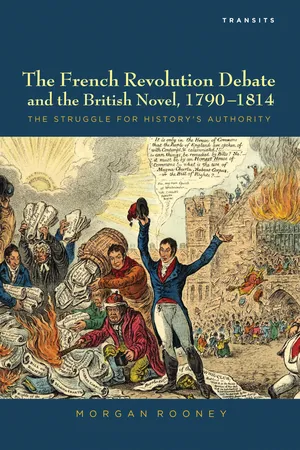
eBook - ePub
The French Revolution Debate and the British Novel, 1790–1814
The Struggle for History's Authority
- English
- ePUB (mobile friendly)
- Available on iOS & Android
eBook - ePub
The French Revolution Debate and the British Novel, 1790–1814
The Struggle for History's Authority
About this book
This study examines how debates about history during the French Revolution informed and changed the nature of the British novel between 1790 and 1814. During these years, intersections between history, political ideology, and fiction, as well as the various meanings of the term "history" itself, were multiple and far reaching. Morgan Rooney elucidates these subtleties clearly and convincingly. While political writers of the 1790s—Burke, Price, Mackintosh, Paine, Godwin, Wollstonecraft, and others—debate the historical meaning of the Glorious Revolution as a prelude to broader ideological arguments about the significance of the past for the present and future, novelists engage with this discourse by representing moments of the past or otherwise vying to enlist the authority of history to further a reformist or loyalist agenda. Anti-Jacobin novelists such as Charles Walker, Robert Bisset, and Jane West draw on Burkean historical discourse to characterize the reform movement as ignorant of the complex operations of historical accretion. For their part, reform-minded novelists such as Charlotte Smith, William Godwin, and Maria Edgeworth travesty Burke's tropes and arguments so as to undermine and then redefine the category of history. As the Revolution crisis recedes, new novel forms such as Edgeworth's regional novel, Lady Morgan's national tale, and Jane Porter's early historical fiction emerge, but historical representation—largely the legacy of the 1790s' novel—remains an increasingly pronounced feature of the genre. Whereas the representation of history in the novel, Rooney argues, is initially used strategically by novelists involved in the Revolution debate, it is appropriated in the early nineteenth century by authors such as Edgeworth, Morgan, and Porter for other, often related ideological purposes before ultimately developing into a stable, nonpartisan, aestheticized feature of the form as practiced by Walter Scott. The French Revolution Debate and the British Novel, 1790–1814 demonstrates that the transformation of the novel at this fascinating juncture of British political and literary history contributes to the emergence of the historical novel as it was first realized in Scott's Waverley (1814).
Frequently asked questions
Yes, you can cancel anytime from the Subscription tab in your account settings on the Perlego website. Your subscription will stay active until the end of your current billing period. Learn how to cancel your subscription.
At the moment all of our mobile-responsive ePub books are available to download via the app. Most of our PDFs are also available to download and we're working on making the final remaining ones downloadable now. Learn more here.
Perlego offers two plans: Essential and Complete
- Essential is ideal for learners and professionals who enjoy exploring a wide range of subjects. Access the Essential Library with 800,000+ trusted titles and best-sellers across business, personal growth, and the humanities. Includes unlimited reading time and Standard Read Aloud voice.
- Complete: Perfect for advanced learners and researchers needing full, unrestricted access. Unlock 1.4M+ books across hundreds of subjects, including academic and specialized titles. The Complete Plan also includes advanced features like Premium Read Aloud and Research Assistant.
We are an online textbook subscription service, where you can get access to an entire online library for less than the price of a single book per month. With over 1 million books across 1000+ topics, we’ve got you covered! Learn more here.
Look out for the read-aloud symbol on your next book to see if you can listen to it. The read-aloud tool reads text aloud for you, highlighting the text as it is being read. You can pause it, speed it up and slow it down. Learn more here.
Yes! You can use the Perlego app on both iOS or Android devices to read anytime, anywhere — even offline. Perfect for commutes or when you’re on the go.
Please note we cannot support devices running on iOS 13 and Android 7 or earlier. Learn more about using the app.
Please note we cannot support devices running on iOS 13 and Android 7 or earlier. Learn more about using the app.
Yes, you can access The French Revolution Debate and the British Novel, 1790–1814 by Morgan Rooney in PDF and/or ePUB format, as well as other popular books in Literature & French History. We have over one million books available in our catalogue for you to explore.
Information
Table of contents
- Contents
- Acknowledgments
- Introduction
- Part I: Reading History in a Revolutionary Age, 1789–1794
- Chapter 1: 1688 in the 1790s: Strategies for Interpreting the Glorious Revolution
- Chapter 2: The Presence of the Past: The Discourses of History
- Part II: Novel and History, 1793–1814
- Chapter 3: Order under Siege: The Discourses of History in the Anti-Jacobin Novel
- Chapter 4: The Crumbling (E)state: The Problem of History in the Novel of Reform
- Chapter 5: Representing History in a Post-Revolutionary Age: Varieties of Early Historical Fiction
- Notes
- Bibliography
- About the Author